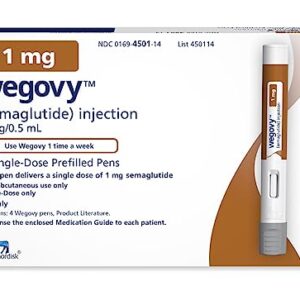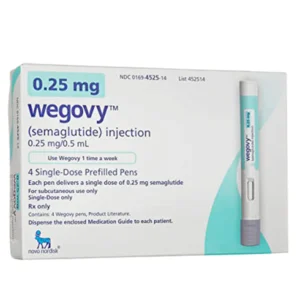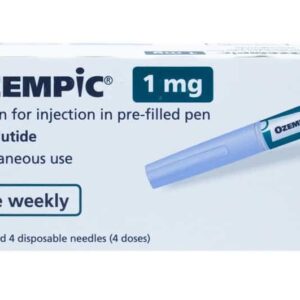Buy Ozempic 0.25 mg Online
Ozempic, a medication primarily used to manage type 2 diabetes, has gained significant attention for its effectiveness and additional benefits, including potential weight loss. The active ingredient in Ozempic is semaglutide, a glucagon-like peptide-1 (GLP-1) receptor agonist. This article delves into the various aspects of Ozempic, including its other names, dosage guidelines, common side effects, overall benefits, and a comparison with similar medications like Wegovy, Saxenda, and Mounjaro.
Ozempic, ein Medikament, das hauptsächlich zur Behandlung von Typ-2-Diabetes eingesetzt wird, hat aufgrund seiner Wirksamkeit und seiner zusätzlichen Vorteile, einschließlich möglicher Gewichtsabnahme, große Aufmerksamkeit erregt. Der Wirkstoff in Ozempic ist Semaglutid, ein Glucagon-like-Peptid-1 (GLP-1)-Rezeptoragonist. Dieser Artikel befasst sich mit den verschiedenen Aspekten von Ozempic, einschließlich seiner anderen Namen, Dosierungsrichtlinien, häufigen Nebenwirkungen, Gesamtvorteilen und einem Vergleich mit ähnlichen Medikamenten wie Wegovy, Saxenda und Mounjaro.
Other Names and Forms
Ozempic is marketed under different names and formulations across various regions and for different purposes. These include:
- Rybelsus: An oral form of semaglutide used for type 2 diabetes management.
- Wegovy: A higher-dose version of semaglutide specifically approved for weight management in adults with obesity or overweight conditions.
- Generic Semaglutide: While not commonly found in generic form, the term may be used to describe the active ingredient in Ozempic and related products.
Dosage Guidelines
The dosage of Ozempic is tailored to the individual’s medical condition, response to treatment, and specific needs. Below are the general dosage recommendations:
- Starting Dose: The initial dose is typically 0.25 mg once weekly for the first four weeks. This allows the body to adjust to the medication and helps minimize gastrointestinal side effects.
- Maintenance Dose: After the initial period, the dose is increased to 0.5 mg once weekly. If further glucose control is needed, the dose can be increased to 1 mg once weekly.
- Maximum Dose: The maximum recommended dose is 1 mg once weekly. For weight management (Wegovy), the doses are higher, typically starting at 0.25 mg and gradually increasing to 2.4 mg weekly.
It is essential to follow the healthcare provider’s instructions and not to exceed the recommended dosage without medical advice.
Common Side Effects
Like all medications, Ozempic can cause side effects. These range from mild to severe and can vary in frequency and intensity among individuals.
Mild to Moderate Side Effects
- Nausea: This is the most common side effect, particularly when starting the medication or increasing the dose. It often decreases over time as the body adjusts.
- Vomiting: Some patients experience vomiting, which can also diminish with continued use.
- Diarrhea: Gastrointestinal upset, including diarrhea, is common but usually manageable.
- Constipation: Less common than diarrhea but can occur, especially in the initial stages of treatment.
- Abdominal Pain: Some patients report mild to moderate abdominal discomfort.
Severe Side Effects
- Pancreatitis: Although rare, this is a serious condition that requires immediate medical attention. Symptoms include severe abdominal pain, nausea, and vomiting.
- Kidney Problems: Ozempic can affect kidney function, especially in those with pre-existing kidney conditions or dehydration.
- Hypoglycemia: Low blood sugar levels are more likely if Ozempic is used with other diabetes medications such as insulin or sulfonylureas.
- Allergic Reactions: Severe allergic reactions, including rash, itching, and difficulty breathing, are rare but require urgent medical attention.
Overall Benefits
Despite the potential side effects, Ozempic offers numerous benefits, particularly for individuals with type 2 diabetes and those seeking weight management solutions.
Benefits in Diabetes Management
- Improved Glycemic Control: Ozempic effectively lowers blood sugar levels by stimulating insulin secretion in response to meals and decreasing glucagon secretion. This dual action helps achieve better overall glucose control.
- Weight Loss: One of the significant benefits of Ozempic is its ability to promote weight loss. This is particularly beneficial for overweight or obese patients, as weight loss can improve insulin sensitivity and overall metabolic health.
- Cardiovascular Benefits: Studies have shown that Ozempic reduces the risk of major cardiovascular events, such as heart attack and stroke, in people with type 2 diabetes. This adds a crucial layer of protection for individuals with increased cardiovascular risk.
- Convenient Dosing: The once-weekly dosing schedule of Ozempic offers convenience and can improve adherence compared to daily medications.
Comparison with Other Medications
Ozempic vs. Metformin
- Efficacy: Ozempic generally offers greater efficacy in lowering blood glucose and promoting weight loss compared to metformin, which is often the first-line treatment for type 2 diabetes.
- Side Effects: While both medications can cause gastrointestinal side effects, metformin is more commonly associated with diarrhea, whereas Ozempic often causes nausea.
- Cardiovascular Benefits: Ozempic provides more pronounced cardiovascular protection than metformin.
Ozempic vs. Insulin
- Weight Impact: Unlike insulin, which can lead to weight gain, Ozempic typically promotes weight loss.
- Hypoglycemia Risk: Ozempic carries a lower risk of hypoglycemia compared to insulin, particularly when used as monotherapy.
- Dosing Convenience: Ozempic’s once-weekly dosing is more convenient than the multiple daily injections required for insulin therapy.
Ozempic vs. Wegovy
- Efficacy in Weight Loss: While both Ozempic and Wegovy contain semaglutide, Wegovy is specifically formulated for weight loss and is prescribed at higher doses. Studies have shown that Wegovy can lead to more significant weight loss compared to Ozempic.
- Indications: Ozempic is primarily prescribed for type 2 diabetes management, whereas Wegovy is indicated for weight management in adults with obesity or overweight with at least one weight-related condition.
- Dosage: The maximum dose for Ozempic is 1 mg weekly, whereas Wegovy doses can go up to 2.4 mg weekly.
Ozempic vs. Saxenda
- Active Ingredient: Saxenda contains liraglutide, another GLP-1 receptor agonist, whereas Ozempic contains semaglutide. Both medications are used for weight loss and diabetes management, but semaglutide (Ozempic) has been shown to be more effective in clinical trials.
- Dosing Frequency: Saxenda is administered daily, while Ozempic is administered once weekly, offering more convenience for patients.
- Efficacy: Studies suggest that semaglutide (Ozempic) may offer superior weight loss and glycemic control compared to liraglutide (Saxenda).
Ozempic vs. Mounjaro
- Active Ingredient: Mounjaro (tirzepatide) is a dual glucose-dependent insulinotropic polypeptide (GIP) and GLP-1 receptor agonist, whereas Ozempic is solely a GLP-1 receptor agonist.
- Efficacy: Mounjaro has shown promising results in both weight loss and glycemic control, potentially offering greater benefits compared to Ozempic. However, more research is needed to fully compare their long-term efficacy and safety.
- Dosing: Both medications are administered once weekly, but their mechanisms of action differ, with Mounjaro potentially offering a broader range of metabolic benefits due to its dual agonist properties.
Conclusion
Ozempic (semaglutide) is a highly effective medication for managing type 2 diabetes and facilitating weight loss. Its multiple benefits, including improved glycemic control, weight reduction, and cardiovascular protection, make it a valuable option for many patients. While it can cause side effects, these are generally manageable and tend to diminish over time. With its convenient once-weekly dosing and significant efficacy, Ozempic stands out as a robust treatment choice for individuals seeking better management of diabetes and weight-related health issues. Comparing Ozempic with Wegovy, Saxenda, and Mounjaro highlights the unique advantages and potential of each medication, allowing healthcare providers to tailor treatments to individual patient needs.






Reviews
There are no reviews yet.